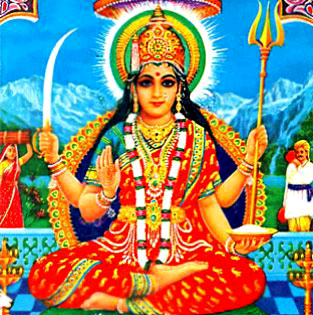 The female divine principle is identified with the name Devi or Mahadevi. Mahadevi is worshipped in two aspects: the tender appearances and the terrifying manifestation. Female gods play an independent role. Their origin traces back to the time before that of the male gods and before the arrival of the Aryans. When they act as wives, the goddesses are inferior. They lack the pronounced character as that of the male gods. They are always depicted smaller in the company of their husbands.
The female divine principle is identified with the name Devi or Mahadevi. Mahadevi is worshipped in two aspects: the tender appearances and the terrifying manifestation. Female gods play an independent role. Their origin traces back to the time before that of the male gods and before the arrival of the Aryans. When they act as wives, the goddesses are inferior. They lack the pronounced character as that of the male gods. They are always depicted smaller in the company of their husbands.
In the Vedas, the goddesses represent natural elements like the dawn and the night and also the aspect of fertility. According to popular belief, the Mother Goddess is a driving force of creation. There are a number of goddesses who are viewed as independent forces. In the Indian Puranas, the female divine principle has an important position. The Tantras attached great importance to the female divinity. On one hand, female strength is the source of all life and on the other hand, it also carries the destruction of life. Devi is seen as a symbol of fertility, maternal wealth, marital reliability, protector of religion and art. In her terrifying forms she is the protector who safeguards and maintains the cosmic order. She is identified with Goddess Durga, Kali and Lakshmi.
This article is a stub. You can enrich by adding more information to it. Send your Write Up to content@indianetzone.com




















